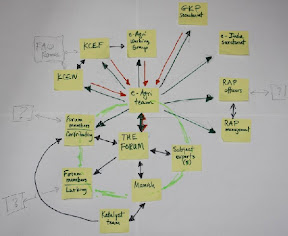
(Image copyright: Brian Riggs 2008)
Thoughts about knowledge sharing, development work, life - some professional, some personal - and the "search for meaning" in general from one person's perspective.

The UN Food and Agriculture Organization (FAO) will facilitate an e-Agriculture panel to deliberate issues of ICT as enablers in various critical areas of development, as well as the role of Public Private Partnerships (PPP) in support of e-Agriculture.
The session will be an interactive discussion with the audience, with the panel anchored by:
- Alexander Flor, Dean, Faculty of Information and Communication Studies, UPOU;
- Manish Pandey, Deputy General Manager, Katalyst-Swisscontact;
- Michael Riggs, Information Management Specialist, FAO RAP;
- Roxanna Samii, International Fund for Agricultural Development;
and Stephen Rudgard, FAO, as the moderator.
The panelists will share knowledge and experiences, and the audience encouraged to contribute on topics such as the use of mobile telephony use in rural areas, with particular reference to ameliorate global soaring food prices, and knowledge brokering services in support of agricultural development, including Communities of Practice and approaches to building capacity.
There will also be a reprise of the issues arising in this year’s PPP online forum and eIndia conference discussion session entitled "Making e-Agriculture Work through Public Private Partnership in Asia". Experience and lessons in Bangladesh (Katalyst) and West Africa (Tradenet) will be contributed.
Full details of the PPP online forum, and reviews of the two sessions organized by FAO, the Global Knowledge Partnership (GKP), OneWorld South Asia and Katalyst in the e-Agriculture track of India's largest ICT Event, eIndia 2008 in July 2008, can be found on www.e-agriculture.org.
For more information on IAALD-AFITA-WCCA World Conference please see http://iaald-afita-wcca2008.org/
 I’m very pleased that we were successful in creating a lively audience-focused discussion, anchored by four experienced panelists. During the 90 minute period we identified the need to move from a focus on PPP to a more inclusive “multi-stakeholder partnerships” (MSP). The importance of MSP was further supported with examples of the important roles that could be played by stakeholders from government, the private sector, NGOs, farmers, intermediaries, and others.
I’m very pleased that we were successful in creating a lively audience-focused discussion, anchored by four experienced panelists. During the 90 minute period we identified the need to move from a focus on PPP to a more inclusive “multi-stakeholder partnerships” (MSP). The importance of MSP was further supported with examples of the important roles that could be played by stakeholders from government, the private sector, NGOs, farmers, intermediaries, and others.

What is the relationship between knowing your audience and communicating to them? If we want to communicate results to policymakers, the private sector and donors... do we take a different approach for each stakeholder? do we change the medium or just the message?The message has to be tailored to the audience, this I believe just from my own professional experience. FAO’s technical publications on climate change are not suited to children studying climate change in grade school. Research journals on climate change may not necessarily give policy makers information in a form they can use for decision making. The impact of climate change is different from the perspective of a local NGO versus an international organization.
